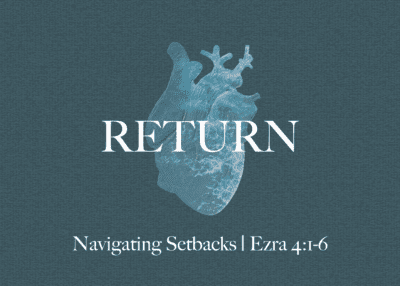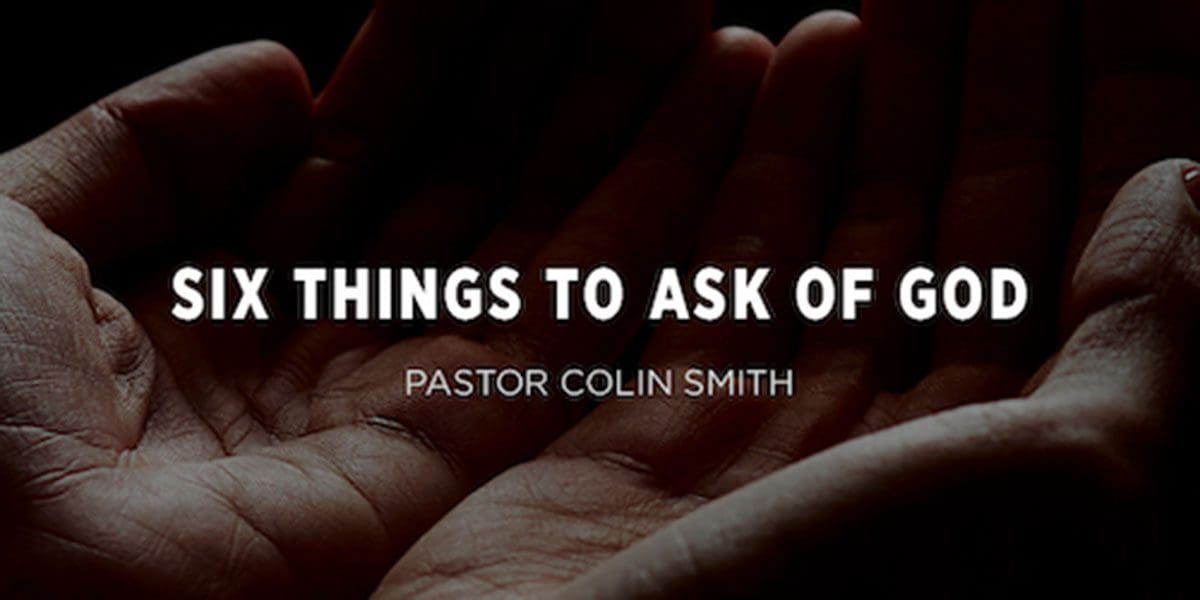“The kingdom of heaven may be compared to a man who sowed good seed in his field, but while his men were sleeping, his enemy came and sowed weeds among the wheat and went away.” (Matthew 13:24-25)
Last week we began with the theme of expectations, what happens when you sow the seed of God’s Word in the life of your children, as a Life group leader, or as a pastor, a church planter, or a cross-cultural missionary. Today we come to a second parable in which our Lord tells us more about the experience of a true Christian in this world.
In the first parable, our Lord spoke about four different kinds of soil. Now it is as if the camera zooms in on the good soil. The other three – the path, the rocky ground, and the thorns drop out of sight. So now we are looking at the good soil. Picture a beautiful field with furrows plowed in straight lines, rich dark soil, and lots of good seed in the ground.
Now what happens with the good soil? The good soil will produce and abundant crop. But that is only half of the story. There is more to be said, and so we have this second parable in which our Lord focuses in on the experience of a true believer in this world.
Seven Elements of Our Lord’s Story
1. The Owner
“The kingdom of heaven may be compared to a man who sowed good seed in his field… The one who sows the good seed is the Son of Man.” (Matt. 13:24, 37)
The one who sows the good seed owns the field. It is ‘his’ field. Then, we are told that “the field is the world” (13:38). So this sower of good seed is the owner of the whole world.
Notice that Jesus says the one who sows the good seed, (the owner of the world) is ‘the Son of Man’ (13:37). Jesus used this name ‘Son of Man’ 84 times in the Gospels and he always used it to refer to himself. [1]
Jesus is described both as the Son of Man and the Son of God. That speaks volumes about who he is: He is God and he is man. As God, he is one with the Father and yet he chose to become one with us in our humanity. The Word became flesh and all that God is is found in him.
This title ‘Son of Man’ comes from Daniel 7, and when you read it you see how significant it is that Jesus took this name as the one by which he most often described himself:
“I saw in the night visions, and behold, with the clouds of heaven there came one like a son of man, and he came to the Ancient of Days and was presented before him. And to him was given dominion and glory and a kingdom, that all peoples, nations, and languages should serve him; his dominion is an everlasting dominion, which shall not pass away, and his kingdom one that shall not be destroyed” (Dan. 7:13-14).
Jesus is saying, “That is who I am! I am the one who will be presented before the Ancient of Days. I am the one who has been given the kingdom in whom people from all nations and languages will serve. I am the one whose kingdom will never pass away!”
He says things that only God himself could ever say and he says them because he is God. He is God with us. So Christ says, “The whole world mine!” He lays claim to sovereign rule over the entire planet. Abraham Kuyper said, “There is not a square inch in the whole domain of our human existence over which Christ, who is Sovereign over all, does not cry, Mine!” [2]
Jesus Christ lays claim to every life! He lays claim not only to every life, but to every part of your life: Mind, heart, will, strength, talent, and energy. He lays claim to every stage of your life: Your childhood, your teen years, your college years, your young adulthood, your middle life, your ‘retirement,’ and your old age.
2. The Enemy
But while his men were sleeping, his enemy came and sowed weeds among the wheat and went away… The enemy… is the devil. (Matt. 13:25, 39)
The owner (Christ) has an enemy, and you cannot understand the world as it is without taking into account the enemy and his work. Christ tells us that his enemy is the devil (13:39). If you do not believe in the devil, remember that Jesus Christ did. He knew his enemy well and was tempted by the devil in the wilderness. He came into the world to destroy the devil and all of his works (1 John 3:8, Heb. 2:14).
The power of this enemy is so great and the work of this enemy is so vast that it took God an incarnation, a cross, and a resurrection to bring his kingdom to a defeat.
3. The Seed
The good seed is the sons of the kingdom. The weeds are the sons of the evil one (Mat. 13:38).
In the Parable of the Sower we looked at last week, the seed was the Word of God that is sown in the ground. But here the picture changes. In this second parable, the seed is people who are growing where they are planted in the world.
Just as there are two sowers, there are two kinds of seed. The different seeds are different kinds of people. The good seed is the ‘sons of the kingdom,’ that is, people who live under the rule of God in their lives. The weeds are the ‘sons of the evil one,’ that is, people who, like the evil one, place themselves on the throne of their own lives.
Notice the destructiveness of the enemy’s work. He sows destructive seed in Christ’s field. He has no positive objective in mind. The motivating force of all his work is simply to destroy the harvest.
There is a foul maliciousness here. The devil is a destroyer. Satan could sow a whole field of weeds in another place, but he has no interest in that. All that matters to him is that he will bring destruction to the field that belongs to the sovereign Lord, to blight his harvest, and to entangle the roots of his people.
Ronald Wallace says, “Precisely where God has been most energetically at work and where the Kingdom is most likely to advance, there the Devil deliberately comes and concentrates his forces to prevent the spread of God’s realm. This is one of the main reason why so many evil things have marred the history of the church of Christ.” [3] The devil desires to bring shame upon the name of Christ, therefore he concentrates on the church.
Do you ever scratch your head and say, “Why have so many terrible things happened in the history of the church of Jesus Christ?” Here is at least part of the answer.
4. The Field
“The field is the world.” (Matt. 13:38)
These words are crucial to understanding what this parable is about. Many writers treat this as a parable about the church, “There can never be a pure church.” That is certainly true this side of heaven. But this parable is not about the church. Yet there are some applications of this parable for the church.
One obvious application is that the church should exercise great caution in regards to discipline. There are times when the elders of the church must exercise discipline for the protection of the church. But surely this parable reminds us that it would be very unwise for elders of a church to think that they could root out everything that is unworthy of Christ. If they tried to do that, they would find themselves pulling up the whole field!
Matthew Henry says, “Great caution and moderation must be used in inflicting and continuing church censures, lest the wheat be trodden down, if not plucked up.” [4]
Alexander Maclaren says: “While we believe that the scope of the parable is wider than instruction in Church discipline, we do not forget that a fair inference from it is that, in actual churches, there will ever be a mingling of good and evil… reason for copying the divine patience of the sower in ecclesiastical dealings with errors of opinion and faults of conduct.” [5]
So there are lessons for the church here. But the parable is not about the church. It is about the kingdom. Jesus began by saying, “The kingdom of heaven may be compared to [this]” (Mat. 13:24). The parable is about what the reign of God in the world looks like.
Jesus says quite clearly, “The field is the world!” And John Macarthur says very helpfully, “This is a picture of the church in the world, not of the world in the church.” [6]
5. The Question
“Master, did you not sow good seed in your field? How then does it have weeds?” (Matt. 13:27)
This is the central question in the parable: “Master, did you not sow good seed? How then does it have weeds?” If God is so good, if Christ is so mighty, then why is there so much evil in the world?
This is a profound question, and it arises in every generation: Where does this evil come from? Why does it persist? If Jesus triumphed over evil on the cross, then why is it flourishing today?
You look at the weeds of evil in the world and you wonder, How can there be a God who is good when his world is in a mess like this? Is God really in control? Can I actually believe in a sovereign God in a world like this?
If the kingdom has come, why does evil continue? This was John the Baptist’s question. He was the forerunner of Jesus, and his message was, “Prepare the way of the Lord.” He said, “His winnowing fork is in his hand, and he will clear his threshing floor and gather his wheat into the barn, but the chaff he will burn with unquenchable fire” (Mat. 3:12).
You listen to him and you think, Right. The Messiah is coming and he is going to deal with evil right now. Then, a few years later, John is in prison. How can that be? If Christ has come to destroy the works of the devil, how is it that King Herod can take off the head of a godly leader like John the Baptist?
John began to wonder, so he sent messengers to Jesus with a question: “Are you the one who is to come, or shall we look for another?” (Mat. 11:3). People assumed that when the kingdom came, the Messiah would blow the whistle and it would be ‘game over’ for evil. But Jesus came without judgment.
Isaiah says the coming Messiah will “proclaim the year of the Lord’s favor, and the day of vengeance” (Is. 61:2). Early on in Jesus’ ministry, he got up and read this, but stopped halfway through the verse! What about the day of vengeance? Grace comes with Jesus now; judgment comes with Jesus later. What’s going to happen between now and then?
6. The Growth
“Let both grow together until the harvest.” (Matt. 13:30)
Evil will grow alongside the good until the return of Christ. That is the teaching of Jesus, and we need this wisdom if we are to sustain a lifetime of ministry, because we need to understand the nature of the world in which we are living.
The 20th century started with an extraordinary humanistic optimism. Charles Darwin captured the imagination of millions with the publication of his Origin of the Species, and the idea that the human race is evolving, we are getting better and better, moving towards a golden age (the 20th century).
What happened? Within 14 years of the turn of the century there was the First World War and the appalling loss of life in the trenches. People said, this will be “the war to end all wars.” But within 20 years, it started again. We were not halfway through the great new century and we had two world wars, the likes of which had never been seen before.
The establishment of the United Nations meant that everything was going to be ok. But with the Cold War and the Cuban Missile Crisis, the whole world was on the brink of annihilation. Then, as we got near the end of the bloodiest century in human history, there seemed to be a shining hope: The Berlin Wall came down. There was going to be a ‘new world order.’ There was going to be peace and the kind of world we could all enjoy.
So we moved into a new century, and within a few years the papers were full of a new kind of war, the ‘war on terror.’ Look at world history and you will see that every time evil gets pushed down, it rises up again in another even more sinister form. The only people who should not be surprised is Christians!
Bishop Ryle saw the special importance of this parable in his own day, “It is eminently calculated to correct the extravagant expectations in which many Christians indulge, as to the effect of missions abroad and of preaching the Gospel at home.” [7]
If you start out with the aim: ‘Let’s go and change the world’ you will be frustrated and disappointed, and you will not sustain ministry for a lifetime. The world never changes. It is always a field in which the wheat grows alongside the weeds. But there will be a harvest! It is worth planting the good seed because God will make it grow even in this troubled world. There will be a harvest – 30, 60, and 100-fold.
Is this world getting better or is it getting worse? Both! This world is getting better and it is getting worse at the same time! The good seed is growing and producing an abundant harvest. The grain on one stalk is much more than the little seed that was cast into the ground. And the weeds are growing too. With every week that passes they are larger and more deeply rooted than before.
Jesus says, “This is a picture of what will happen in the time between my resurrection and my return.” Ronald Wallace says, “Jesus Christ never taught that the movement of earth’s history would take the form of a slow but steady development of the good upon this earth accompanied by the gradual elimination of evil. He taught rather that the more the good developed, the more evil might also develop to ripen with the good. [8]
7. The Harvest
“At harvest time I will tell the reapers, ‘Gather the weeds first and bind them in bundles to be burned, but gather the wheat into my barn.’” (Matt. 13:30)
We are living in the day of God’s grace. The Day of Judgment has not yet come, and until that day, this is what the kingdom will look like: Good wheat in a field laced with weeds.
It has become popular, especially among younger Christians, to talk about ‘bringing in the kingdom,’ or to set things right in the world. It’s important to remember that ‘bringing in the kingdom’ means pulling up the weeds, and breaking up the great power structures of evil in this world. That work of judgment belongs to Christ. He has not given it to us to do.
He calls us to live and grow in this world until he comes and brings about a righteous judgment in which all will be brought to account before him. That day will come, and when it does, the weeds will be gathered and bound together in bundles.
Matthew Henry says, “Sinners of the same sort will be bundled together in the great day.” There will be a bundle of cynics, a bundle of blasphemers, a bundle of cowards, a bundle of liars, and a bundle of hypocrites. But the wheat God will gather into his barn.
Abigail said to David that his life would be, “Bound in the bundle of the living in the care of the Lord your God” (1 Sam. 25:29). That’s beautiful!
Three Applications from our Lord’s Story
1. Stay Engaged
“Let both grow together.” (Matt. 13:30)
In this world, the wheat and the weeds grow together. Christ anticipates that your roots as a believer will be intertwined with the roots of people whose nature is very different from yours. That will be true at school and in business. You will find, even in your own family, that there are relationships that are very difficult, but your roots are intertwined and Jesus says, “Don’t pull up the roots. Let both grow together until harvest.”
Where has God rooted you down? Where have you been sown? Stay engaged! Don’t be on an agenda of withdrawal from the world. There are no ideal spots in this world. Wherever Christ sows his people Satan sows his weeds. So bloom where you are planted. Augustine said, “Those who are weeds today may be wheat tomorrow.” [9]
2. Practice Tolerance
“Let both grow together.” (Matt. 13:30)
The word tolerance had been hijacked in our culture. It used to mean showing patience and forbearance towards people with whom you radically disagree. Now it is used to mean affirming what others affirm. But there is no need for tolerance between people who affirm the same convictions. If you agree what is there to tolerate?
Tolerance is a wonderful Christian virtue that is needed where there are deep seated disagreements. It means showing patience and forbearance towards people you find really difficult, and with whom you radically disagree. It does not mean passivity. It does not mean that you give up concern for another person’s spiritual condition. Jesus makes it clear that in this world, the wheat needs to grow alongside the weeds until the Son of Man comes.
Always remember, the mission of the church is sowing seeds not pulling weeds. We have a big enough challenge on our hands trying to deal with sin in our own hearts, our own families, and our own churches. It is not in our power or in our calling to root it out in the world. That is the work of Christ and he will do it when he comes.
3. Anticipate the Harvest
Then the righteous will shine like the sun in the kingdom of their Father. (Matt. 13:43)
God will harvest the wheat. He will bring his people home, and the righteous will shine like the sun. With whom will you be bundled on that day? May you be found in the bundle of life with the people of God who submit their lives to King Jesus and stand before the Father in the grace that they find in him.
[1] Wayne Grudem, Systematic Theology, p. 546, Zondervan, 1994.
[2] Abraham Kuyper, cited in Abraham Kuyper: A Centennial Reader, ed. James D. Bratt, p. 488, Eerdmans, 1998.
[3] Ronald Wallace, Many Things In Parables, p. 30, Wipf & Stock, 1997.
[4] Matthew Henry, Commentary on the Holy Bible, Vol. 5, p. 85, The Religious Tract Society, 1835.
[5] Alexander Maclaren, The Gospel of St. Matthew, Vol. 1, p. 245, Hodder & Stoughton, 1992.
[6] John Macarthur, Commentary on Matthew 8-15, p. 377, Moody, 1987.
[7] J. C. Ryle, Expository Thoughts on the Gospels, p. 106, Crossway, 1993.
[8] Ronald Wallace, Many Things in Parables, p. 35, Wipf & Stock, 1997.
[9] Cited in J. C. Ryle, Expository Thoughts on the Gospels, p. 147, Crossway, 1993.
[elementor-template id=”128476″]







